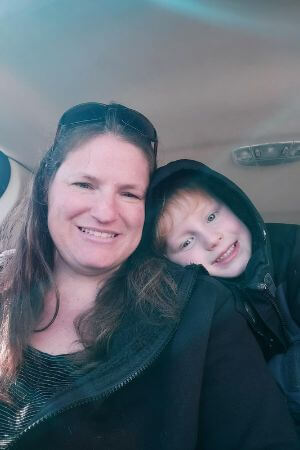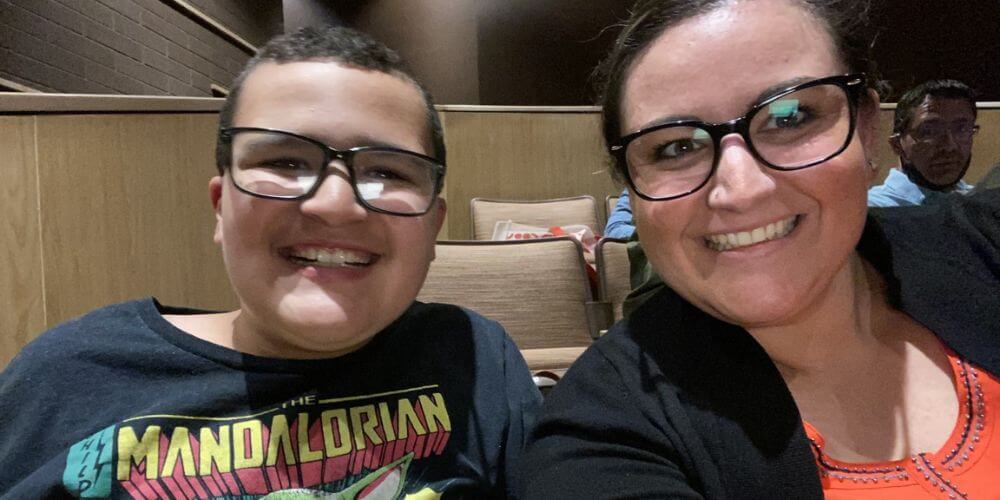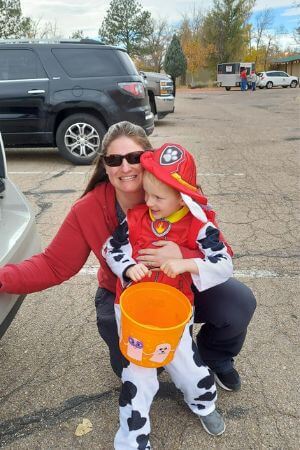Kids – and Parents – Build Friendships at Hopebridge Autism Therapy Centers
June 13, 2022
June 13, 2022

Though every child’s needs and goals are different, communication and socialization with peers are often part of the programming at Hopebridge. Sparking new relationships is often an exciting part of the process for these kids, whose families may have wondered if their autism diagnosis would hinder their abilities to make friends. These interactions are a welcome – and significant – part of the autism therapy services at the center, but it’s extra special when parents within the autism community get the opportunity to form their own connections, too.
As many families know, making friends as adults can sometimes prove trickier than when we were kids. There are schedules and activities to line up, on top of the sometimes-awkward-yet-totally-acceptable “can I get your phone number?” questions (just ask Bluey and her dad, Bandit). Additional challenges stemming from autism can make those potential relationships even tougher, as not everyone is as accepting or understanding of what the diagnosis entails and its effect on families, which many caregivers must also navigate.
That is partly what makes these relationships developed in our centers so extraordinary, as we recently had the privilege to hear more about from two of our Hopebridge moms, Lacey and Bree.
The story of these two “besties” starts with some super-cool kids, much like most of our stories.
Mason, whom his mom calls a “wild and crazy boy,” loves going on outdoor adventures and is obsessed with Godzilla, Paw Patrol and dinosaurs. At 5 years old, he adores animals, especially his puppy, Fritz. On the day we spoke to his mother, Lacey, he claimed he was a buffalo.
This fun-loving boy is also diagnosed with autism spectrum disorder (ASD), anxiety, apraxia, sensory processing disorder and sensory modulation disorder. His family and pediatrician began noticing some of his symptoms, such as a speech delay, when he was only 1 year old. Other signs of autism began to appear by the time he was 3 years old. Lacey told us he did not make eye contact, did not like being touched, and was not tolerant of people besides his parents. His meltdowns were a big challenge. His mom told us that she couldn’t do laundry; if she attempted to change his crib sheets, he would tantrum for hours.

Though he took part in early intervention services, it wasn’t until he received his autism diagnosis and could participate in applied behavior analysis (ABA therapy) that he began seeing progress. He started ABA therapy, speech therapy and occupational therapy with Hopebridge in early 2021. Soon after, Mason began saying a few words, then put sentences together after several months, and is now exploding with words, though his apraxia does not always make it easy. Not only is Mason talking, but ABA therapy has helped him open up to other people, from playing with therapists and peers in his center, to greeting his grandfather, which is a huge step for him. He is more comfortable with transitions and can also better advocate for himself.
Mason was the first child to begin services at the therapy center in Aurora, Colorado, which was new to the area at the time. Among a few other kids, Gavin was another child to start services within those first few weeks.
At 10 years old, Gavin’s parents call him a “gentle giant” who is a big jokester. His mom, Bree, told us that he just started playing basketball and though he may not be the best player on the court, when someone falls down, he is the one who picks them up and pats them on the back. He loves dancing to the sounds of Lady Gaga and Pink, along with any other music that has a strong beat he can feel. He’s the type of person who always sees the best in people and keeps those around him motivated.
Gavin began experiencing behavioral challenges around 3 years old. He was verbal, but when upset, would become aggressive, shut down and was not able to explain his emotions. He had a difficult regulating and his parents dubbed him “Hulk.” He was diagnosed with ADHD and ADD, but he was not diagnosed with autism until he was 9 years old. The family previously lived in Alaska, where Bree says the resources were limited, so it wasn’t until they moved to Colorado that they received the support he needed.
Soon after his ASD diagnosis, Gavin began services at Hopebridge to help him strengthen his social skills. He was only there for a short time because he has since moved on to environments with children closer to his age (Hopebridge focuses on early intensive behavioral intervention for younger kids), but the impact of the center has lasted so much longer for their entire family.
This is because yes, the center supported Mason and Gavin through their own goals, but it also brought the two families together.
It was their husbands, Trent (Mason’s dad) and Justin (Gavin’s dad) who officially met first. During their chat, they realized they both lived in Anchorage for a time, which would turn out to be one of many similarities between them. The wives then picked it up from there the next time they saw each other.
“I’m super shy and reserved, so when Lacey first said ‘hi,’ I was so flustered that I didn’t acknowledge her. The next day, I made a point to explain and talk to her, and we blossomed from there,” said Bree. “Besides both of us living in Alaska, we realized my family used to live in the same neighborhood they do now. It was like the universe was saying, ‘This is your friend. This is your tribe.’”

Lacey values their relationship, as she had yet to really find her support system up until that point. When Mason was first diagnosed, she learned about a few support groups, but some were difficult to get into because of the pandemic, some were only video chats, and others took place during evening hours, which were difficult for her to join because of dinnertime and bath time. She found Parent to Parent USA (P2P), which was initially beneficial in connecting her to a fellow “support mom,” but she lives in North Denver while Lacey is in the southeast, so they don’t get to see each other as often as they’d like.
“From the moment Bree and I met, we talked all the time. She and I have become best friends,” said Lacey. “It’s been great to have someone to turn to and say, ‘Girl, you will not believe what this one did …’ I don’t feel so alone anymore.”
Unlike Lacey, Bree has had a connection to the autism community since before Gavin was born, because her younger brother (now 18 years old) was also diagnosed with ASD and ADHD. She was in high school when he was born, so she was really involved in his care and acted like a second mom to him. Although caring for someone with autism was not entirely new to her, every parent can use a friend throughout the journey.
The connection with Lacey was important to Bree because when the pandemic began, she worked full-time from home, but also had to care for her three kids and make sure Gavin got help in school. She said her mental health wasn’t doing well and she eventually left her job to care for her kids full time. It was a difficult transition for her, even though it gave her the time to dedicate to Gavin’s needs.
“It’s nice to have people who understand the rough days and know what we’re going through. They know that if one little thing changes, there are times when the entire day can feel like it’s ruined.” said Bree. “But we’re also there during big moments. To watch Lacey’s son, Mason, thrive is exciting. I’ve gotten to watch them work through their trials and tribulations and let her know that we’ve been there.”
Even though Mason and Gavin are now in different places for therapy, their families stay in touch. The boys may be different ages, but it works out for Mason to have play dates with Bree’s youngest child, which keeps them in close contact.
While it’s incredible these two moms found each other, it is our hope and theirs that others outside the autism community open their minds and hearts to it for support, as well.

“When we’re out in public, if Mason has a breakdown, people sometimes look and judge us. They don’t realize that at the playground, I can’t just say, ‘It’s time to go,’ without a struggle. I can’t tell him to stop crying because he doesn’t understand why he’s crying. I wish others would be more patient with us,” said Lacey.
Bree has similar wishes. Beyond her son and brother, she has already seen the power of this acceptance and advocacy through her daughter. Only in kindergarten, this young girl already knows what it means to care for others, no matter their differences. She’s become a fellow classmate’s safe zone, someone he can come to when he has challenges, simply because treats him kindly. After witnessing this, Bree urges other parents to teach their kids that we’re all different and should be kind to each other.
“Understand that other people are going through things, and we don’t know what’s going on in their personal lives,” said Bree. “People may not necessarily be staring, but it can feel like that sometimes. I want people to realize that these kids and their parents are struggling in these moments. Instead of judging when you see something in public, consider offering to help. We’ll have so much more success in society if more of us did this.”
Lacey and Bree also left us with some advice and helpful reminders about autism for other families whose children are on the spectrum.
“Everybody is different! Remember that there are no two kids who are the same. What may work for my son may not work for someone else. Parenting can feel like a learning and guessing game, but we’re all doing the best we can to help our children succeed,” said Lacey.
“Even if today is a bad day, tomorrow will be better. You have an amazing child who sees the world differently, and that allows you as a parent to look at it differently, too. Try to think positively and know that it always works out. It doesn’t matter how, but that’s not for us to figure out,” said Bree.
Like Bree and Lacey, we want to help you find your crew while also helping your child discover and build the skills they need to lead their best life.
From opportunities for your child to build onto their strengths and find independence in everyday tasks, to family guidance so you can help them put those newfound skills into action outside center walls, we are here to support you—and our other families are, too. Contact us now to take the next step through autism testing or an ABA evaluation.
*Informed consent was obtained from the participants in this article. This information should not be captured and reused without express permission from Hopebridge, LLC.